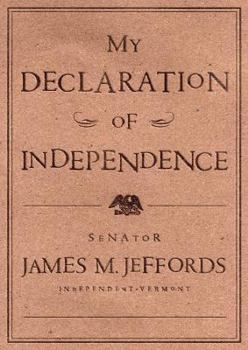My Declaration of Independence
No Synopsis Available.
Format:Hardcover
Language:English
ISBN:0743228421
ISBN13:9780743228428
Release Date:November 2001
Publisher:Simon & Schuster
Length:144 Pages
Weight:0.10 lbs.
Dimensions:7.3" x 0.7" x 5.1"
Customer Reviews
5 ratings
How the Republican Party Lost A Leading Moderate Voice
Published by Thriftbooks.com User , 19 years ago
As a Pennsylvania state legislative leader, I have suffered a demotion from Majority Whip to Minority Caucus Chairman for the past twelve years because several Democrats switched to the Republican Party in 1993 and 1994 and turned the Pennsylvania House over to the Republicans. Two of those converts were then defeated by Democratic nominees, but two others were not, and having the majority helped the Pennsylvania Republicans gain other seats. So I read the story of Jeffords' abandonment of the party that elected him, and his turning control of the U.S. Senate over to the Democrats, with a sense of having seen this before. Policy differences lead to personal confrontations and personal slights which, in turn, raise new questions about partisan commitments. The chance to play a starring role in the new party seems preferable to being an outcast in the old party. The change is made, and old alliances and friendships are sundered, while new ones are made. Running for re-election after a party switch can be tricky, but Jeffords, with four years left on his Senate term, "doubted" that he would be running again in 2006. In fact, he did not run again this year. With re-election clearly not a top priority for him--"it was the furthest thing from my thoughts at that point," he says--a major obstacle to swictching parties was removed. The Jeffords switch came in May, 200l. George Bush had been elected President in key respects by a 5 to 4 U.S. Supreme Court decision stopping the counting of votes in Florida where Bush held a lead of only a little more than 500 votes. The Democrats had gained four seats in the U.S. Senate in the 2000 elections, and the parties were now evenly divided in the Senate. It seemed quite possible that the Democrats had a future of surging ahead. Further, although he does not mention it, his home state clearly was trending Democratic, with Howard Dean as Governor, Patrick Leahy as the other U.S. Senator, and Bernie Sanders, a self-proclaimed socialist who often sided with the Democrats, repeatedly elected with Democratic support as an Independent. For some reason, Sanders' name is never mentioned in this book; in 2006, he was the winning Democratic-backed candidate to succeed Jefords. Jeffords had leverage in the budget negotiations, and was determined to use it. He decided his top priority, as chair of the Senate committee dealing with education, was giving new life to the Individuals with Disabilities Education Act (IDEA) by increasing special education funding by removing $200 billion a year from President Bush's tax cut and paying "40 percent of the national average per public expenditure for each disabled child's education." This formulation comes out to about 20% of total national special education expenses. Jeffords was motivated by personal values and constituent accountability in pushing his educational program. He did not share the belief that tax cuts for the wealthy were the highest Republican priority
Truly an excellent account of why he did what he did.
Published by Thriftbooks.com User , 24 years ago
This was a very enjoyable account of what went on in Senator Jeffords mind as he struggled with what was a very difficult decision. It was very enlightening too about how things really work in congress and how people reacted to his decision (both positively and negatively). I consider what he did to be a heroic act, even though I may not agree with all of his goals, I respect him for doing what he believed despite the great personal cost (both to himself and those he cared about). I would say this to anyone considering this book and reading thru the various reviews - be careful about those reviewers who can only view this in terms of how it affected them or their beliefs. Senator Jeffords makes his decision beyond party politics, if you want to know why - here it is.
A candid and thorough telling of an important story
Published by Thriftbooks.com User , 24 years ago
Speaking may not be Sen. Jeffords' forte, but he has managed to lay out a compelling story of a decision which changed the American political landscape as much as any election could. Political figures come to life in his account. His generosity of spirit also shines through the text. He's very different from those who ultimately drove him away from a party which has become quite strident in its conservatism and lacking in its compassion in recent years.Kudos to the Senator (and to his aide Mark Powden, who doubtless had a big role in bringing this project to completion) for his courage and for sharing the inside scoop so completely. A must-read for those who care about the future of American politics.
Not high art, but a must read
Published by Thriftbooks.com User , 24 years ago
This book isn't particularly well written, and it does not give great insights into Jefford's soul. This book tells the story of how and why James Jeffords, my beloved senator, left the Republican party. This book should be read because it is honest, something that we don't hear much anymore. It is an interesting story, and worth your time, whether you believe that he did what was right or not. And remeber to ask for integrity in your own representitives.
A Must-Read Memoir!
Published by Thriftbooks.com User , 24 years ago
For anyone interested in contemporary politics, My Declaration of Independence is a candid--and fast-reading--account of the defection from the Republican Party of Senator Jim Jeffords last May. Regardless of your opinion of Jeffords' move, his memory is sharp and the events that led to the "switch" become real and his motives become clear.A great book!





